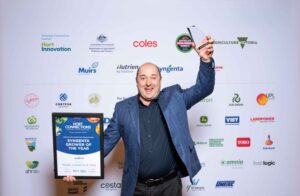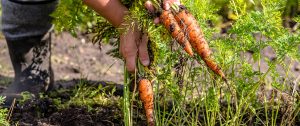Orange turns to gold for Rocky Lamattina & Sons
Victorian carrot grower Rocky Lamattina and Sons’ focus on sustainable, efficient farming has been recognised with the Syngenta Grower of the Year Award.

The trio of brothers behind Victorian grower Rocky Lamattina and Sons focus most of their attention on the colour orange, but in June they got a taste of gold when they were presented with the Syngenta Grower of the Year Award at the Hort Connections 2024 Gala Dinner.
One of the largest carrot growers in Australia, Rocky Lamattina and Sons has expanded to a 5,000ha business through an approach the Lamattina family calls ‘growing low risk’.
Since its establishment in the early 1990s, the grower has tried its hand at a number of complementary businesses beyond the farmgate. In recent years, however, Rocky Lamattina and Sons has recentred itself on what it sees as its core competency – efficient farming that’s sustainable both ecologically and economically.
“The thing we really look at is being consistent, and to have a process in place that our children and their children can continue utilising,” says company director Angelo Lamattina.
A carrot focus
Angelo runs the business alongside his brothers Phillip and John, as well as a team of more than 100 staff, after taking over day to day operations from their father, company founder Rocky Lamattina.
The Lamattinas migrated from Italy in the early 1950s when Rocky was five years old, and the family bought a four acre property in Clayton where they set up a market garden, then on the outskirts of Melbourne and a major hub for market gardens and fruit orchards. Rocky worked on the farm with his father and two brothers.
The family farm relocated to Cranbourne in the early 1970s, then to the Mornington Peninsula in the late 1980s, before Rocky and his brothers split the operation to go out on their own. One stayed in Cranbourne, one on the Mornington Peninsula, and Rocky settled on the northwest Victorian town of Wemen.
“He was probably ahead of his time when we talk about sustainability, but he was looking for somewhere where there was water availability and the land was economically priced,” says Angelo.
Rocky’s dream had originally been to grow carrots and potatoes, but he eventually realised that competition from washed potato growers in South Australia was too hot.
“The customer base was heading more towards a South Australian grown potato rather than a Victorian potato, so that’s where we decided that we would concentrate on just growing carrots,” Angelo explains.
In 1991, Rocky and his wife Kathy bought a 200ha property in Wemen. His sons Angelo and Phillip came on board straight away, and their brother John joined them a few years later after finishing school.
Close to the Murray River, Wemen offered the ability to grow carrots all year. Two years later, the Lamattinas bought another 200ha in Wemen, the first in a number of expansions to their Wemen operation.
“We felt that we could grow carrots in our Wemen home base year-round, but when we had the millennium drought come along, we changed our focus a bit,” says Angelo.
The lack of water threatened the ability to grow carrots at Wemen during summer.
“Around midway through the drought we needed to do something to survive, and we ended up purchasing land south of Wemen, originally in Naracoorte in South Australia before finding a more suitable property near Kaniva,” says Angelo.
The Kaniva farm is now the focus for summer production, while Wemen covers spring. In mid-winter, however, carrot growth on both properties was slower than the Lamattinas liked.
The last piece to the puzzle was a small property in St George in Queensland purchased in 2017, which fills that 10-week winter production window from September to November.
“Now here at Wemen we’ve got 2,200ha, and at Kaniva its about 2,400ha, and then up in St George it’s 320ha,” says Angelo. “We’re producing 55,000-60,000 tonnes of carrots a year.”
Everything for the carrots
 Everything about Rocky Lamattina and Sons’ farming operation revolves around maximising carrot quality and yield.
Everything about Rocky Lamattina and Sons’ farming operation revolves around maximising carrot quality and yield.
Their carrots are grown in a three or four year rotation, with each carrot crop being followed by a cereal break crop, a brassica biofumigant crop that’s chopped back into the ground, and then depending on timing an additional sorghum crop.
“We’re harvesting one of the fussiest root crops, carrots,” says Angelo. “If your soil isn’t healthy, the issues you can have can be a detriment to the business. You get cavity spots, other diseases, nematodes, stuff like that.”
The crop rotation, particularly the biofumigant crop, is a major part of Rocky Lamattina and Sons’ weed and pest management, and the additional organic matter in the soil reduces fertiliser requirements and increases water use efficiency.
“We don’t use any chemicals at all for nematode control because of the natural fumigation we get out of our cover crop,” explains Angelo.
Refocusing on farming
In an effort to diversify, over the years Rocky Lamattina and Sons has been involved in a number of business ventures beyond carrot production.
Faced with unreliable plastic packaging supplies, in 2001 the grower set up the Adelaide-based Wing Flexible Packaging, which supplied them and other customers with produce and ice bags.
In 2014, the grower bought a carrot juicing plant near Mildura to turn second grade carrots into juice concentrate for export to Japan, where it was reconstituted and sold through vending machines.
But while both side businesses were going well, they were a step too far outside the core focus of Rocky Lamattina and Sons as a grower.
The juice business has since been sold, and the grower now instead sells second grade carrots to a number of other companies who produce juice for the domestic and international markets.
The packaging business has also been sold in order to refocus on the farming side of the business.
“We sold the packaging business last year, and the main reason we’ve done that is stay in our expertise of farming,” explains Angelo.
“The plastic industry was fantastic while we were in it, but we found a very good company to purchase the business, and we still buy bags off them.”
Expanding into a new crop
With the decision to focus the business on its core farming expertise, Angelo says the drive to diversify has led to the expansion into a crop other than carrots – the first in the business’s 33-year history.
Rocky Lamattina and Sons is in the process of establishing a pistachio farm, spurred on by rising demand for the nut from Australian consumers. The grower has planted around 240ha so far, with another 60ha going in this year. The eventual target is 450ha of pistachio orchards.
“That’ll give us something else to keep ourselves off the street for a little bit,” says Angelo. “They do take about 10 years to produce, so it’s a long-term project, but with the next generation coming along and looking for something to do, we felt that it was a good idea.
“There wasn’t many people who felt pistachios were ticking the box for them because of the time it takes to get a return. That suited us because we’ve got our carrot income, and we felt the risk was lower of doing something that less people were doing.”
Sustainable process for the next generation
Alongside the new pistachio operation, Angelo says every part of the business is driven by a desire to hand an efficient, sustainable business on to the next generation.
Two of Phil Lamattina’s sons are already in the business, and more of Phil, John and Angelo’s younger children seem likely to join in coming years.
“That’s what we’re doing it for,” he says. “My dad was working for his kids, and I work for my kids, and my kids will work for their kids.
“You’ve got to be confident that you can hand over the reins in a way that you know is going to work. It’s not like you just say, you know, we’ve done the best we could but it’s not really working, so here’s the reins and see what you can do. That’s not what we want.”
“We find that the way we operate, we know that our children and their children can continue doing what we’re doing, and it will continue working.”
Angelo Lamattina accepts the Syngenta Grower of the Year 2024 award for Rocky Lamattina & Sons at Hort Connections 2024 Gala Dinner.
